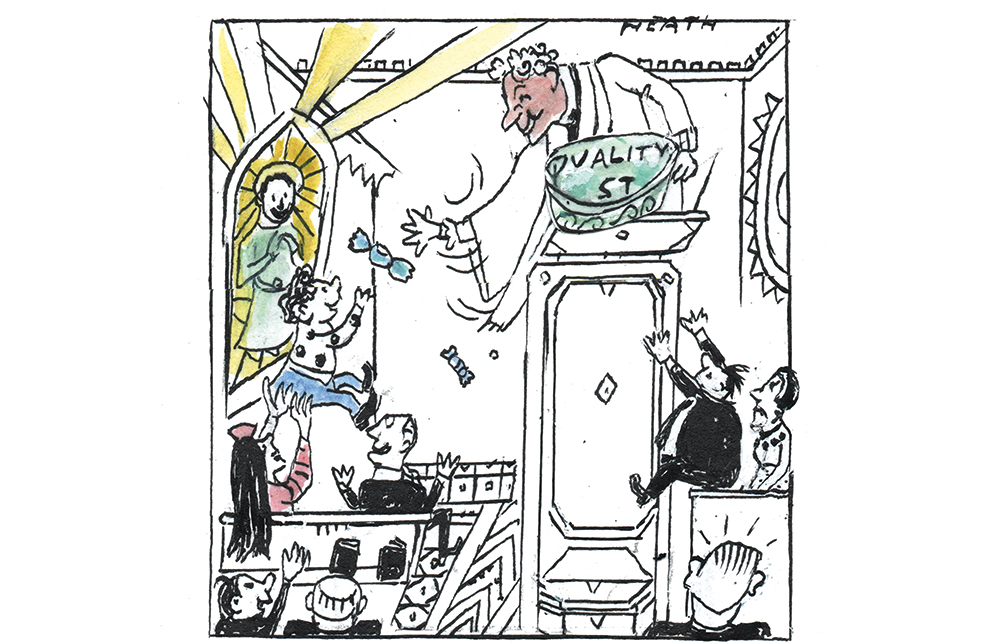Missing: one king, answers to Balthazar. Wandered off last Epiphany with a French peasant girl who had a basket under each arm and an eye for wise men bearing gold and smellies. Could have returned to Babylon, more likely made for Lewisham. We will miss him at our church crib this year. While paintings of Jesus’s birth have been found in early Christian catacombs, the first live Nativity scene is said to have been created 800 years ago next Christmas by St Francis of Assisi as a visual aid for preaching. The idea spread, with statues replacing the living oxen, asses and shepherds. During the French Revolution, when churches were closed, one Jean-Louis Lagnel, an artist from Marseille, made clay figures of the Holy Family and supporting cast so that people could create Nativities at home. He dressed them in Provençal clothes and represented the shepherds as local tradesmen, setting the Christmas story in his community.
A collection of these santons fetched up in south-east London years ago at All Saints, Blackheath, where I am churchwarden, a gift from parishioners who holidayed near Avignon. They are placed at the stable before Midnight Mass, with the wise men making their way round the church to arrive on 6 January. At which point last year Balthazar and his lavender-seller vanished, presumed nicked. Our santons had come from a Claude Carbonel, who calls himself Monsieur Crèche on his website, or Mr Crib, so I placed an order in September for a new Balthazar and villager. I had offered to buy Le Curé to represent our vicar, but he felt the Berger couché, sleeping off lunch, might be more him. Six weeks later, neither had arrived. Emails went unanswered. Had Balthazar been stopped by Brexit? Or Herod? I asked a French friend to try. He had no joy, but found furious complaints on review boards from others. Mr Crib had taken my £120 and vanished. Another santonnière, cheaper but less well made, rescued us just in time for Advent but I hadn’t realised that along with having to organise rotas, lock doors, deal with leaks and, as our oath says, ‘maintain order and decency in the churchyard’, a warden would spend so much time pursuing kings.
We could have fudged it with two, rather than giving Melchior and Caspar a new companion. The Bible doesn’t say there were three kings, any more than it specifies the fruit that Eve ate. The Syriac Orthodox Church goes for 12 magi, which must make for a crowded stable. The tradition of three kings comes from St Matthew saying they brought three gifts: gold, frankincense and myrrh, not a football shirt, scarf and vuvuzela as they do in a retelling of the Nativity that the C of E sent out recently after realising that the World Cup clashed with Advent. As well as advice to weave football into our services (what a blow for Church House’s outreach programme that Gabriel Jesus, the Brazil striker, hobbled home from Qatar), it was suggested we avoid having a carol service on Sunday 18 December as that is when the final will be. ‘It may be best to host one on Saturday,’ the C of E said. At All Saints we will not make accommodations for a silly football game. And we couldn’t move it to the Saturday anyway: it would clash with Blackheath’s rugby match against Sevenoaks.
I write this with two violet candles lit on the Advent wreath. The next will be pink for Gaudete Sunday and our vicar will wear a chasuble embroidered with roses. This is more subtle than the vestments worn by Bill Scott, the flamboyant late vicar of the very high St Mary’s Bourne Street in Pimlico, who used to serve his flock kir royale after mass. One Gaudete Sunday, I saw Scott ascend to the pulpit wearing a cerise creation with gold trim and begin his sermon by saying: ‘This is the time of year when I like to dress up as a Quality Street.’
One of Blackheath’s delightful traditions for 40 or so years was the Christmas Eve procession through the village with children as Mary and Joseph, accompanied by a donkey, brass band and hundreds of people singing carols. Some years they would stop at the Crown pub and be told by the innkeeper there was no room. Once, when the sky was crisp and clear, it coincided with the International Space Station passing overhead, which I told my daughter was Santa Claus starting his deliveries. The vicar might have preferred the Star of Bethlehem. Like the santons of Provence, it rooted Christmas in our community. Then came Covid. Unable to gather for two years, we asked the police if the procession, which they had always supported, could resume. Muttering about insurance, they initially refused, then said we should speak to the council about closing the road for the 20 minutes needed. The council didn’t return calls, but its website said to speak to the police about processions. Back and forth. In the Covid age, it is much easier just to say ‘no’ than ‘how can we help?’. We might have had more success if we had wanted to stage a protest, since they seem to be allowed to cause disruption at will. Perhaps we could have superglued a few choristers to the road. Instead, a week into Advent, I finally spoke to the police inspector who, perhaps realising that a story about cancelling a Christmas tradition would be bad PR, was much more helpful. If we provide marshals, the procession can go ahead. Perhaps miracles do happen at this time. Now we just need the Balthazar and his Provençal paramour to show up with a baby.






Comments